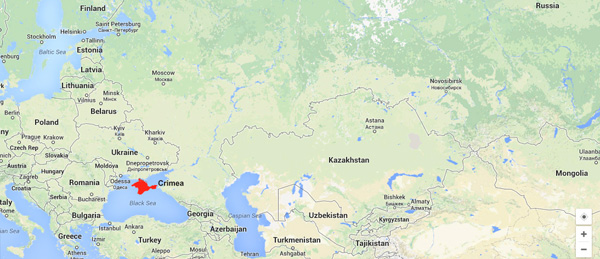
I was invited to speak on the issue of sanctions in the context of Crimea. I decided to decline the invitation, because I do not believe that it is the main issue at all.
Instead, the issue is one of Ukraine’s shift in allegiance from Russia to EU, which is not a problem by itself, but this would constitute a backdoor entry of NATO right up to the Russian border, on the pretext of Ukraine joining the EU. That is clearly a security problem for Russia, and therefore Putin had to take some necessary steps.
I have, therefore, offered some remarks on Ukraine instead. These will be read by somebody on my behalf at the panel discussion.
Nadeem Naqvi, PhD
Professor of Economics
KIMEP University
Almaty, Kazakhstan
April 7, 2014
~~
With 30% of Europe’s energy needs, and 38% of Germany’s, met by Russia today, there is substantial economic, and thus political cost that Russia can inflict on the region. Further, six countries in Europe depend on Russia for 100% of their energy needs. Germany also has in excess of $400 billion invested in Russia, including in, though not limited to, Volkswagen and BMW operations there. In the face of such an economic reality, what kind of sanctions can Europe impose of Russia?
Moreover, the U.S. has no economic relationship with Russia to speak of. And the disruption of relations between the U.S. and Russia can only be to the political benefit of China, which is the part of Asia to which President Obama is seeking to pivot military influence.

As for Ukraine, in addition to $2.2 billion that it already owes to Gazprom Russia, commodities such as chocolate, cookies, and now six kinds of Ukrainian agricultural exports have been banned by Russia. The kind of economic cost that Russia can, and perhaps will, inflict on Ukraine will lead to mind-boggling social unrest. Note should also be taken of the fact that while Russia had offered $15 billion in aid to Ukraine, of which $3 billion was delivered, President Obama begged Congress for loan guarantees—not hard aid, only loans—in the amount of one billion dollars. Only one!
As Ukraine recently decided to realign itself away from Russia, and towards the EU, a natural consequence would have been the subsequent NATO expansion to Ukraine, which is actually in the backyard of Russia. Any further eastward expansion of NATO is seen by Russia, reasonably enough, as a serious military hazard, especially in light of the U.S. threat to install missiles and missile-guidance systems in Poland and the Czech Republic.
To avert this threat, Russia had to take some action that would convey to NATO an unambiguous message that its entry into Ukraine, or into Georgia before that, would not be tolerated. Thus, a new regional political equilibrium could well be characterized by Ukraine’s eventual entry into the EU, but it would have to come with a guarantee that NATO would stay away from the Russian backyard. These are the characteristics of the new regional political equilibrium that can be observed to be taking shape, with the clear presence of the Russian Black Sea fleet in Sevastopol as a deterrent to potential NATO expansion towards Russia.
It is also a historical fact that the Crimean peninsula had been a part of the Russian empire since the decree of 1784 by Katherine the Great. It was ceremonially gifted by President Nikita Khrushchev in 1954 to Ukraine under Soviet law, with Russia further agreeing to leave it with Ukraine in 1994, when Russian economic and political influence was in shambles in the immediate aftermath of the Soviet disintegration.
Moreover, in the context of international law, Richard Falk, Albert G Milbank Professor Emeritus of International Law at Princeton University, writes in the April 6 issue of Al Jazeera:
A . . . precedent is the U.S.-led invasion and occupation of Iraq in 2003, after the UN Security Council rejected involvement. Here was an instance of blatant aggression on false, trumped-up premises; an intrusive, regime-changing occupation; and the deliberate manipulation of religious and ethnic tensions by the occupying power to create the kind of Iraq that it wanted to emerge.
He further goes on to say:
When done by Russia, such behavior is criticized as disruptive. But when done by the U.S., the use of force is benignly described as “the aggressive pursuit of American values” . . . international law is invoked as a matter of diplomatic convenience whenever it seems to support one’s foreign policy. The U.S. is adept at mounting such arguments. The real test of adherence to international law, however, is the behavior of a leading government when international law poses an obstacle to a preferred course of action. To insist that one’s adversaries adhere to international law, while claiming discretion to act on one’s own interests, is a hegemonic form of world order that accepts the inequality of states as a given. This goes against the major premise of international law that presupposes all states should be held to the same standard.
It is also noteworthy that there are exactly two countries that President Putin thanked for their support in his successful attempt at reunification of Crimea with Russia: China and India. And, it is remarkable that Russia is part of the BRICS (Brazil, Russia, India, China and South Africa) trans-continental alliance, which is not only home to 42% of the world population, but whose GDP in purchasing power parity is now greater than the GDP of the EU, let alone that of the U.S.
The pockets of the BRICS are so deep that this month the alliance is proceeding to set up its own monetary fund, which would render the IMF considerably marginalized, because the U.S. has failed to grant greater voting powers to the BRICS in the IMF. This event follows the earlier founding of the BRICS’ own development bank to supplement the activities of the World Bank, as announced in their 2012 New Delhi joint communique.
In fact, when the international economic landscape undergoes substantial change, and the geopolitical institutions fail to keep pace with the new economic reality, these old institutions become relegated to the sidelines. This is a natural consequence of what Karl Marx in 1859, in A Contribution to the Critique of Political Economy, referred to as the change in the political superstructure consequent upon a change in the economic base of any social formation. President Putin actually made reference to this phenomenon in Munich in 2007 in terms of shift in the “centers of economic growth” that will inevitably be transformed into sources of political influence in a new, multipolar world (which had become unipolar with the demise of the USSR in 1991).
Thus, with the current austerity drives in the U.S. and the EU, leaving little room for providing economic support to Ukraine, and with war chests of foreign exchange reserves in the hands of the BRICS, there is little doubt that Ukraine will not get any lifeline of the $14-18 billion from the IMF, without undertaking gut-wrenching economic, especially fiscal reforms, in the coming years. Such austerity reforms will necessarily cause widespread human suffering in Ukraine. And social unrest is, unfortunately, the consequence of pervasive suffering.
Ukraine never really recovered from the financial crisis of 2008. Rampant corruption in the country, including that by the recently deposed president, added to the misery of the citizens of Ukraine. The last thing Ukrainians need is to suffer from an additional prolonged period of deprivation. The Ukrainian Hryvnia has already depreciated by 30% against the hard currencies of the world in recent months.
The moral imperative for the world is not to quibble about whether there was annexation; Crimea is now part of Russia, and will remain so. Nor is it helpful to assign blame to this country or that. After all, it was the in-your-face NATO expansion eastward that provoked a reaction from Russia. Instead, the moral imperative for the leaders of the world is to formulate and implement plans that would prevent lives being left threadbare for vast numbers of people of Ukraine. Anything else would be reprehensible insofar as it serves to divert attention away from the excruciating suffering that lies in store for over 45 million additional men, women and children.












